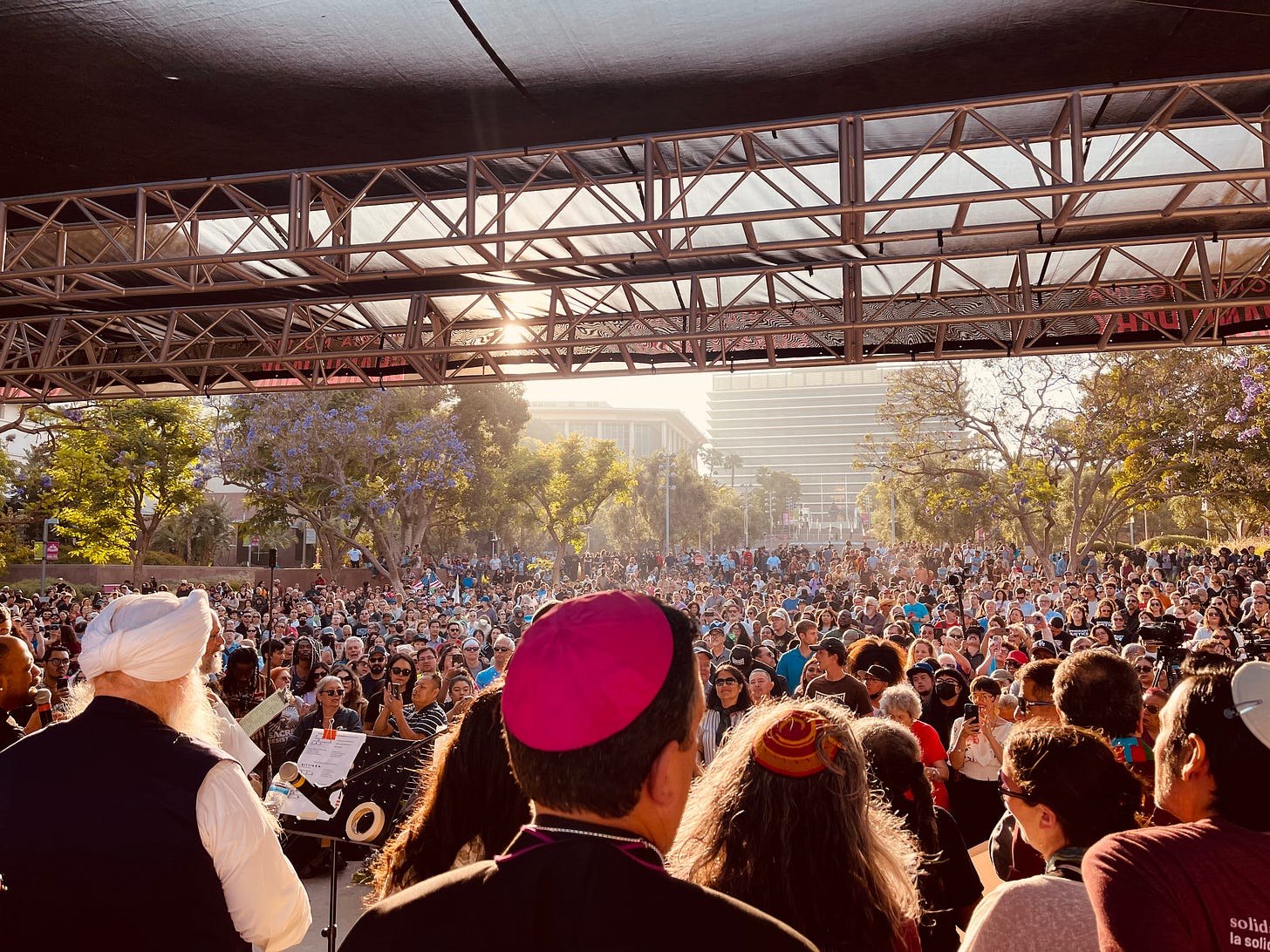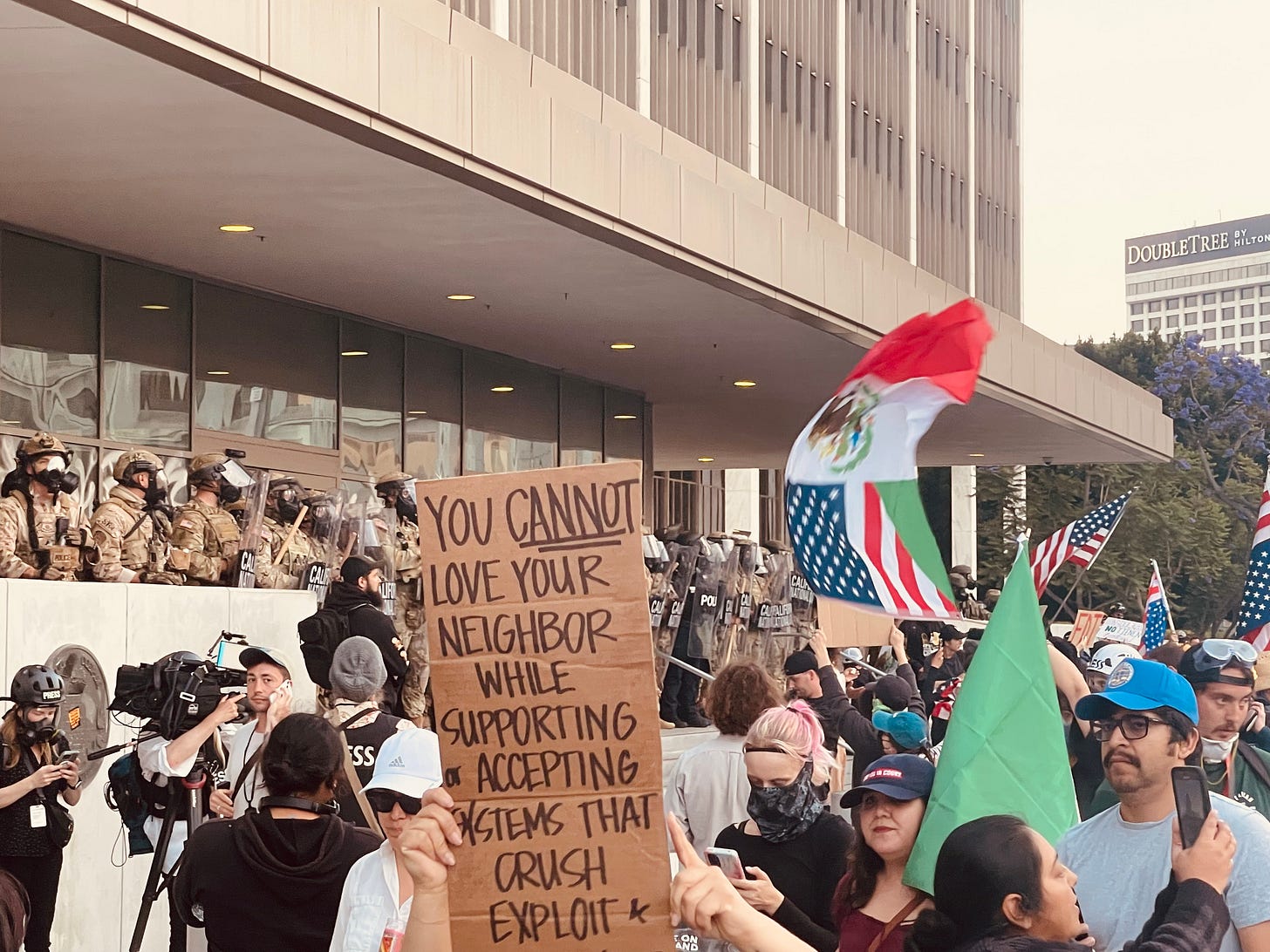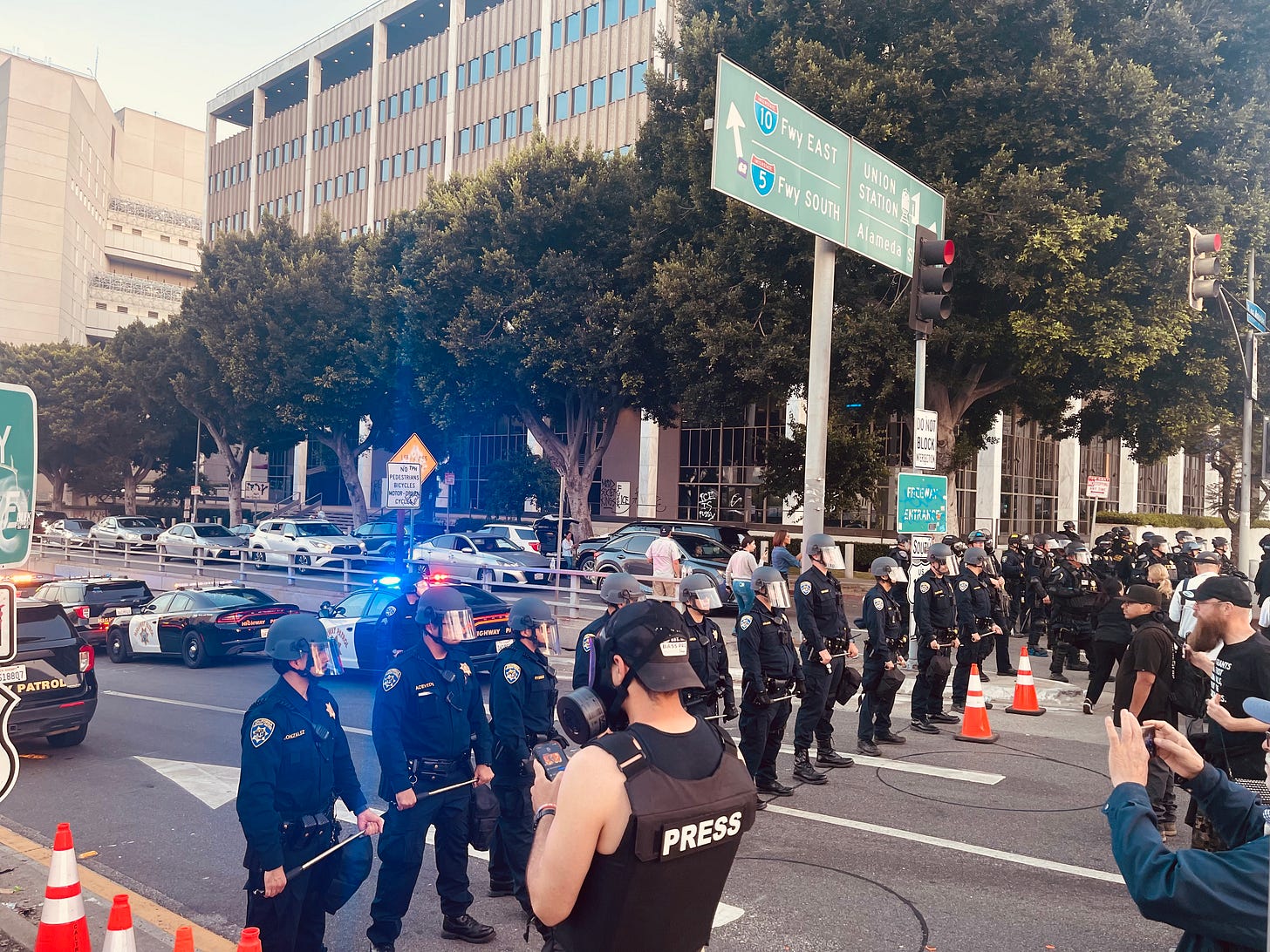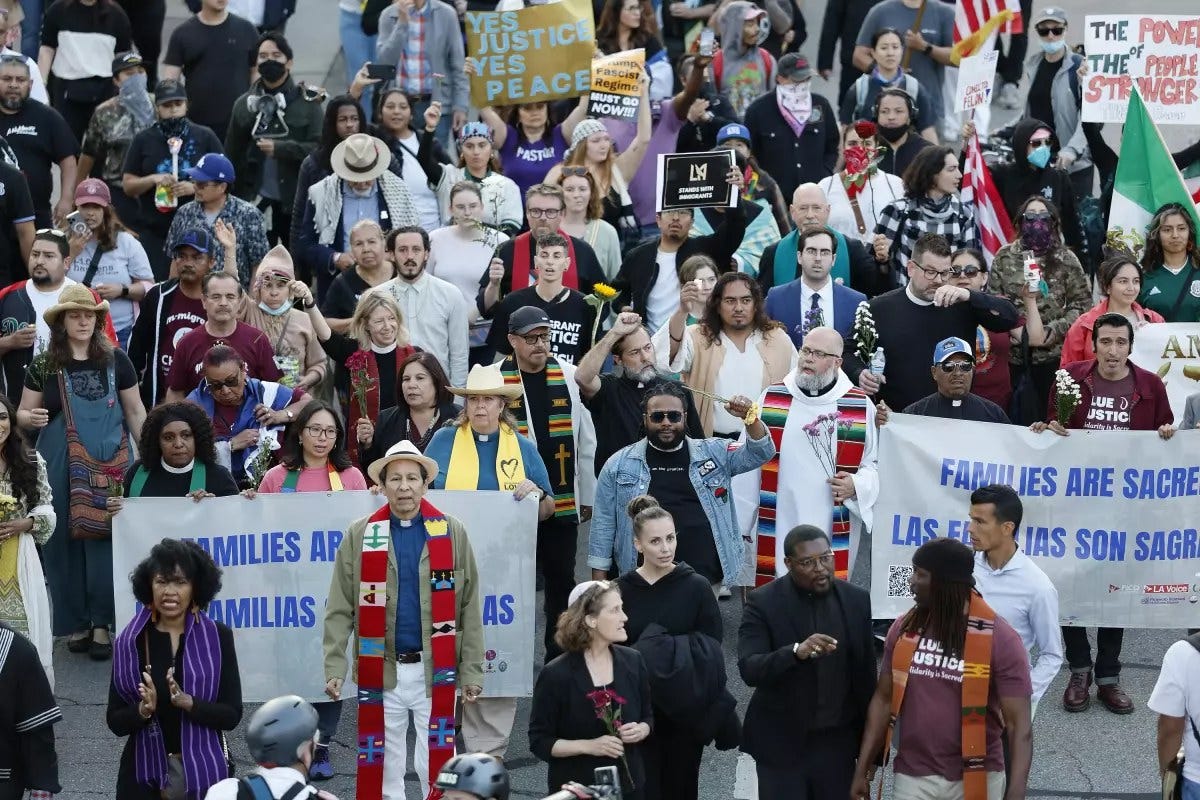Encountering the Spirit of God in the City of Angels
A week ago, I witnessed the remarkable fruits of peacemaking temporarily transform downtown Los Angeles, one of the most significant centers of ongoing political turmoil within our nation’s increasingly polarized landscape. It was a lesson and a witness to the prophetic power of ministering as the Savior would, at a moment in our country when many find themselves relentlessly tossed within a political “war of words and tumult of opinions.”
At this time, it is my firm conviction that members of the Church of Jesus Christ of Latter-day Saints must stand for the revealed principles which have been repeatedly expressed by leaders of our faith on the question of how to respond to our immigrant neighbors—documented and undocumented alike.
Though the Church remains “politically neutral” in refraining from taking partisan sides, endorsing candidates, or encouraging/discouraging its members from affiliation with any specific party, on the topic of immigration, it remains morally committed to the following:
1. To peacefully obey the law, engage in lawful means of civil and political action, and be peacemakers during contentious times.
2. To follow Jesus Christ in loving our neighbors, which entails all of God’s children irrespective of immigration status, national origin, political affiliation, or other qualities.
3. To support the fundamental sanctity of families in keeping them together, while providing “basic food and clothing, as our capacity allows, to those in need, regardless of their immigration status.” Notably, according to Church policy, the immigration status of individual members is treated as a complex personal matter that does not preclude one from being found worthy for baptism, temple ordinances, callings, missionary service, or receiving forms of humanitarian relief. Local leaders are instructed not to inquire after the immigration status of members as a precondition to church participation, to follow all the laws in ministering to undocumented individuals in their personal circumstances, and to extend compassion, relief, and support to all of God’s children as outlined in formal Church policy.
Returning to my own experience, on the evening of June 10, 2025, as part of my official calling as the Los Angeles Stake Interfaith Director and with the approval of my local leadership, I joined with other local faith representatives and clergy in taking part in an interfaith prayer vigil near the Cathedral of Our Lady of Angels. The intent of our assembly was to “gather in prayer and reflection,” to “call for nonviolence,” and to “stand in solidarity with our immigrant neighbors.”
The event was non-partisan, not sponsored by or endorsing any particular party or politician, and took no collective stance on any specific law or proposed bill. Rather, it represented an assembling together of diverse neighbors and spiritual communities in shared concern, compassion, and advocacy for sacred values that we hold in common—extending them towards a city that desperately needs ministers and peacemakers at this time.
After being ushered onto the stage where various clergy and city officials were gathered, I looked out onto a mass of hundreds of faces reflecting the significant cultural and racial diversity characteristic of Southern California. I found myself deeply moved by the prayers offered from Sikh, Christian, Jewish, Muslim, and other religious speakers as they spoke of the pain currently felt among the immigrant members of our respective communities. Their message was clear: peaceful, lawful, and nonviolent action is the only way forward through these current challenges. Our faith, our love for our neighbors, and our commitment to being good members of society demand it.
“We will not turn our gaze. We will not fan the flames of extremism. We will not answer violence with violence,” declared one of the rabbis in attendance.
And so, with candles and flowers in hand, we collectively walked to the Department of Homeland Security Federal Building, not knowing exactly what we might encounter there. We sang hymns from previous eras in which unrest and threats to civil rights abounded. We chanted eternal truths to which Latter-day Saints are no strangers:
“Families are sacred! Families are sacred! Families are sacred!”
The organizers, composed of local immigration nonprofits and neighboring faith groups, were incredibly mindful and exhibited tremendous care with the message we were communicating. From time to time, they called the attention of the crowd to make sure everyone remained safe, calm, and controlled. We marched past occasional shattered glass we did not break, graffitied messages we did not write, and crowds of passionate demonstrators already in the area.
In finally approaching the line of riot shields and armed federal authorities, our group was encouraged by the organizers to take a knee and join in prayer as curfew approached. Some individuals handed their flowers to the assembled law enforcement officers or laid them at their feet. Their silent gazes were steady.
Behold, your neighbors, the Spirit testified to me as I vocally wished the security personnel a safe night free of harm or violent struggle as some of the clergy, projecting their voices with speakers, urged the larger crowds to remain peaceful, to be wholly committed to total nonviolence, and to lawfully disperse at the proper time. There, meeting my own gaze, was my reflection upon the face masks of the guards.
By 8:00 PM, true to our word, we departed as peacefully as we had arrived, with many of the other demonstrators choosing to do the same. The Los Angeles Times later wrote how “Los Angeles had its quietest night in a week on Tuesday,” crediting the miracle, in part, to the coordinated calls of local faith leaders towards nonviolence and intentional peacemaking.
It was incredibly heartening to see the impact such efforts had on the remainder of the night, in which fewer than two dozen—out of thousands—ended up remaining on the streets from within an hour of curfew being declared.
In witnessing this outcome, my mind turned to the inspired counsel of our beloved prophet, President Russell M. Nelson:
“Anger never persuades. Hostility builds no one. Contention never leads to inspired solutions. Regrettably, we sometimes see contentious behavior even within our own ranks.”
“One of the easiest ways to identify a true follower of Jesus Christ is how compassionately that person treats other people.”
“The Savior’s message is clear: His true disciples build, lift, encourage, persuade, and inspire—no matter how difficult the situation. True disciples of Jesus Christ are peacemakers.”
“We can literally change the world—one person and one interaction at a time. How? By modeling how to manage honest differences of opinion with mutual respect and dignified dialogue.”
“The pure love of Christ is the answer to the contention that ails us today. Charity propels us “to bear one another’s burdens” rather than heap burdens upon each other. The pure love of Christ allows us “to stand as witnesses of God at all times and in all things”—especially in tense situations. Charity allows us to demonstrate how men and women of Christ speak and act—especially when under fire.”
The resonance of these words was not lost on me as my mind returned to the tense scenes of protest from earlier.
Ultimately, President Nelson concluded his remarks with the invitation that “[We] have . . . agency to choose contention or reconciliation. I urge you to choose to be a peacemaker, now and always.”
This cannot be done from the bleachers alone. At some point or another, all of us who desire to be disciples must be prepared to meet the crowds where they are with the Beatitudes inscribed on our own hearts. The Spirit of God is that of peacemaking, of Christlike ministering, of engaging with the world's strife with civility and courage, living and advocating for the values of our faith.
Last Tuesday night in downtown Los Angeles, the Spirit of God descended upon the "City of Angels" through the prayers and collaboration of diverse faith leaders, and—at least for one night—the passions and hearts of many were calmed, allowing for demonstrators, law enforcement, and federal officials alike to avoid needless harm or danger, to lay down their weapons of war, and for greater peace to be proclaimed.
Postscript: With a heavy heart, I wish to highlight the loss of one of our fellow siblings in the Gospel, Arthur Folasa Ah Loo, who was accidentally killed as an innocent bystander during political demonstrations this weekend in Salt Lake City. A fundraiser in support of his surviving wife and two children can be found here.
Jaxon Washburn is a doctoral student at UCLA, specializing in Armenian religious history. He also writes often on interfaith dialogue, Mormon theology, and comparative religion.










Incredibly moving and spiritually uplifting take on the harrowing challenges our nation is facing. Thank you for reminding us all of the real work it takes to be a peacemaker (much more than staying silent or on the sidelines). I appreciate your example and learn so much from you, always.